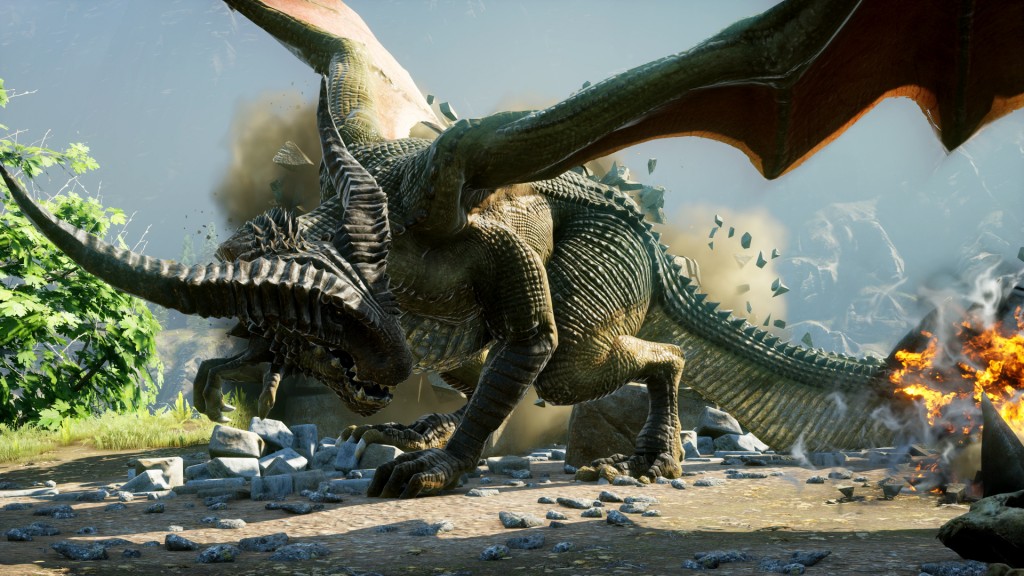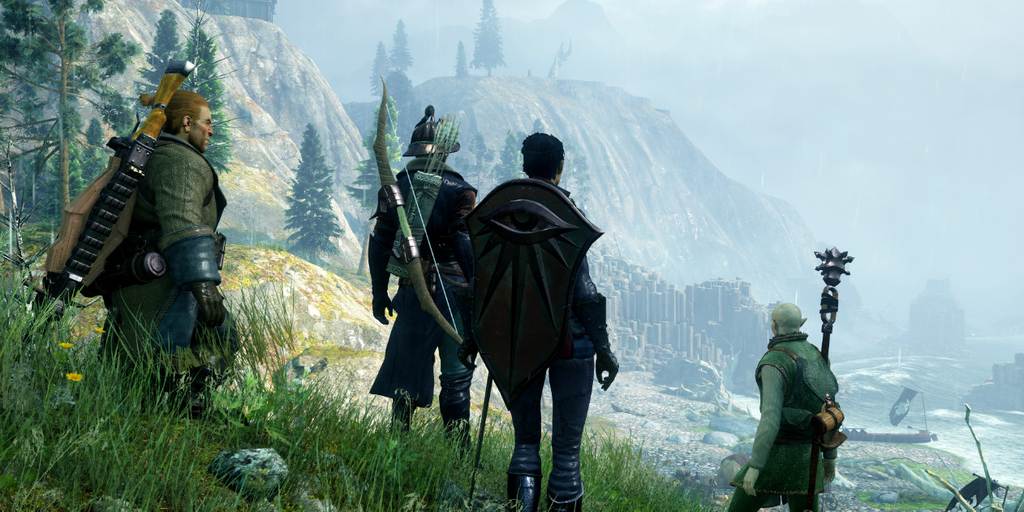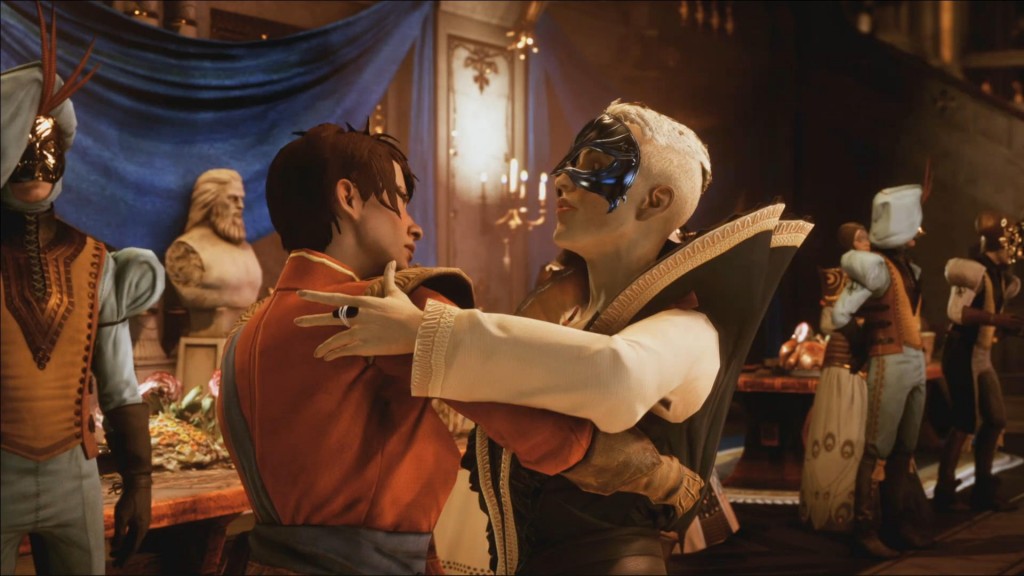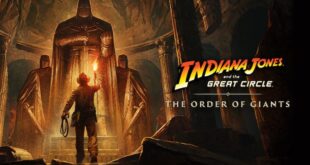Few games can tackle questions of faith and belief. Taking the RPG trope of an everyday-person thrust into the heart of events beyond their comprehension, becoming the only person able to save the world, it’s surprising most titles haven’t tackled such themes sooner.And yet, when you emerge from the Rift, the sole survivor of an unknown terrorist attack on the Chantry, you’re asked not if you’re guilty, but if you’re the second coming itself. A Herald of Andraste, sent from the heavens to save those doomed below.
Well, are you?

Dragon Age: Inquisition places the player character as the Inquisitor, the head of the titular organization. After a strange series of events, you are found to have the power to destroy Rifts, portals to the Fade that spew out demons and rip apart the world. You don’t know how you got these powers, but those who saw you say a golden woman resembling Andraste, the goddess of Thedas’ main religion, was seen with you. You are then thrust into leadership of an arm of the Chantry called the Inquisition. Their goals are simple: to enact change, establish peace between the warring factions throughout Thedas, and most of all, to save the world from the Rifts in the sky, growing more numerous each day.
As the Inquisitor, you’ll recruit a number of companions and set out into the vast world of Thedas. Split between Orlais and Ferelden, the landscape of this game is beautiful, and there’s always new sights to behold. From the thundering shores of the Storm Coast to the vast expanse of the Hinterlands and the Hissing Wastes, there’s a great variety of locales, each with their own troubles and objectives.
While the number of main storyline quests is small, the number of sidequests is massive, rivaling most MMOs. Some fall a little short, like “collect X amount” quests, but others are exciting and filled with depth and lore. Companion quests especially stick out; in typical Bioware fashion, you can discuss events with your companions and get to know them better, possibly even romancing them. As your relationship with each grows, you’ll be asked to complete a task for them, and these missions provide a huge amount of backstory, while also showcasing the massive cast of characters and scenery built up in Dragon Age’s universe.

The companion variety is great, and I was always checking in with my party members after major missions to learn more about them. Beyond just companions, there’s also your advisors to interact with at your stronghold. They’ll give you special missions as well, but also consult you at your war table as you undertake operations for the Inquisition.
Operations can be completed by any of your three advisors, and take time to finish (though the clock thankfully ticks down even when you’re not playing). These will cost you both time, in having your advisors unavailable for further assistance, and sometimes a resource called Power, that progresses the main story and represents the overall strength of your Inquisition. The rewards, however, are often worth the longer wait times and gathered resources: extra weapons, new areas to explore and Influence to gain perks for your party and forces. You can gain agents to assist your advisors as you manipulate Orlesian politics, send forces in to assist towns, and manage a force greater than any Bioware title before.
In combat, your Inquisitor and his forces become a force to be reckoned with. The abilities are a nice mix, and the combat includes the best aspects of both its predecessors. The tactical cam is back, providing an omniscient view of the battlefield, while Dragon Age 2’s brutal and fast combat keeps you on your toes. Overcoming strongholds and slaying dragons is an amazing experience, though on higher difficulties, you will miss the tactics of previous titles.
Gone are the “if-when” statements, replaced only by a threshold you can set for each companion to use health potions, and a list of preferred, allowed and do-not-use abilities. The lack of depth in these systems means that most players who tackle the higher difficulties will spend a significant amount of time micro-managing instead of fighting.
Throughout all the constantly moving machinery of exploration, combat, and the Inquisition, there is a looming sense of urgency that goes largely unaddressed. After meeting the main antagonist, you know your enemy, and largely know what his goals are as well. There’s a disconnect, though, in that you never feel a looming sense of dread or a need to quickly earn that last bit of Power you need to stop his next operation. It’s hard to create such a vast world with so much side content and still make the player feel like there’s a time-sensitive threat, but having some sort of time mechanic implemented would go a long way in making the evil threat of Inquisition feel more important than finding a new logging stand.

The overall story, however, is brilliant. As the Inquisitor, you are hailed as the Herald by some, and called a blasphemer by others. You’ll be asked to find peace between mages and templars, to weigh the needs of few against the many, and to sit in judgement of some of the greatest criminals and most sympathetic aggressors throughout the land.
After conquering a mission, the leader of the enemy faction was brought in front of me. He was a Tevinter mage, attempting to imprison my companions, conquer my land and erase me from existence. He was sympathetic, however; he was told that by doing all this, he could save his son, who was doomed to a slow death from the Blight.
Should I kill him? Imprison him? Force him to work for the Inquisition? If left alive, he could prove a threat in the future, but killing him would anger some of my companions and lose potential connections to Tevinter, a formidable power in Thedas. I decided I couldn’t keep him around, couldn’t kill him, and couldn’t let him go, so I made him Tranquil. A horrible punishment for mages that removes all their magic, but also their emotions.
I thought I had made the right choice, but when I talked to a companion later, he looked at me with disgust. “Tranquil?! At least kill him and leave him with some dignity!” I left him a husk of a man, forced to sit idly by and watch his son pass, with no power to help him.
I was wrecked by this, more than most choices I had faced in any consequence-oriented game. I sit here, some 60 or 70 hours into the game, and my mind still drifts back to that choice. The story of this game is strong, but the greatest moments happen in the minutia. A clever joke from the foul-mouthed Sera, or learning the truth behind the name of Varric’s crossbow, Bianca. Dragon Age: Inquisition has captured not just the breadth of commanding a force of devout zealots, but the highs and lows of having the weight of the world laid squarely upon your shoulders.

Final Thoughts
Dragon Age: Inquisition is a grand title. It has more content that most AAA releases this year, contains amazing story and character moments, and is filled to the brim with quests, operations and objectives to fulfill.
While there are some shortcomings, they are overshadowed by the breadth of this game and the beautiful moments found throughout it. This is a testament to Bioware’s growth throughout the years, and a strong showing of what’s to come. All you need do is take up the mantle of the Inquisitor, and prepare for a truly epic journey.
 BrutalGamer Bringing you Brutally Honest feedback from today's entertainment industry.
BrutalGamer Bringing you Brutally Honest feedback from today's entertainment industry.





